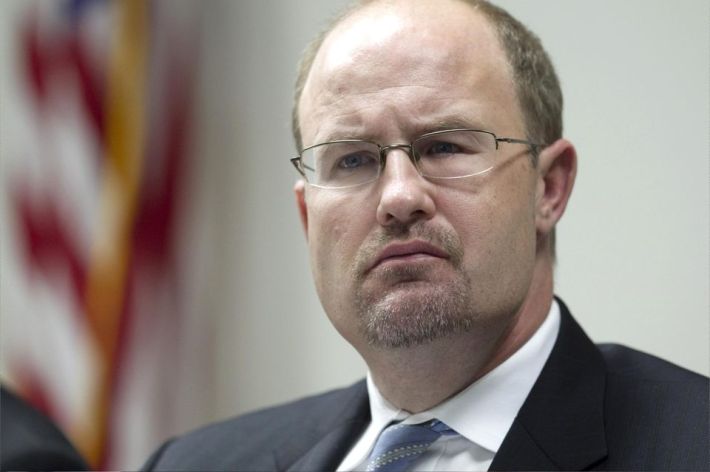This is the final installment in our three-part “Revolving Door” series about how cronyism in state DOTs leads to wasteful highway building. The first part profiled Ohio DOT chief Jerry Wray and the second part looked at Oklahoma DOT boss Gary Ridley. Both Wray and Ridley left the DOTs to work as asphalt industry lobbyists, only to return to the public sector later on.
This edition of our Revolving Door series features TxDOT Director Phil Wilson, whose chief qualification for leading the $10 billion-a-year agency seems to be not his transportation or administrative expertise, but his cozy relationship with the governor.

Wilson has held half a dozen public offices under Texas Governor Rick Perry, including secretary of state and personal communications director. While Wilson was serving as the governor's deputy chief of staff, in 2006, he helped set in motion a "public private partnership" on wind energy that cost taxpayers a bundle, but offered some personal benefits to both him and the governor. We relay this anecdote, even though it doesn't directly relate to transportation, because it speaks to the level of cronyism and deal-making that Wilson brings to the office of state-wide transportation commissioner in the second most-populous state in the union.
As a member of the governor's cabinet, Wilson recommended the state pay for the construction of utility lines from wind farms in the western part of Texas to the more populous eastern half. He estimated the deal would cost Texas taxpayers a few hundred million dollars. But according to a report from Texans for Public Justice [PDF], when contracts were awarded in 2009 the price had ballooned to $5 billion.
By then, Wilson had left the Perry administration to work as vice president and lobbyist for the energy company Luminant, one of the country's largest wind energy buyers. Between 2008 and 2011, Phil Wilson reported he received between $250,000 and $470,000 in total compensation as a lobbyist for Luminant, according to Texans for Public Justice. (In Texas, lobbyists report their wages in ranges.) Meanwhile, Wilson helped Texas Energy Future Holdings, the parent company of Luminant, win the biggest utility line contract, for a cool $1.3 billion, TPJ reported.
At the same time, according to the Center for Media and Democracy, Luminant was stepping up to help ensure Rick Perry's reelection. The company donated $633,575 to the governor's campaign fund from 2001 to 2011. Last year, the whole thing came full circle when Perry welcomed Wilson back into public service. Wilson was appointed by Perry to head TxDOT, making him the first non-engineer ever to hold the position. The Texas media criticized the appointment, calling Wilson a "political hack" with a thin resume. Terri Hall, founder of Texans Uniting for Freedom and Reform, called the move "flaming pay-to-play cronyism."
The cherry on top for Wilson was a $100,000 raise compared to his predecessor, a licensed engineer. The TxDOT Commissioners at the time -- all Perry appointees also (notably including Ned Holmes, a prominent Perry donor and developer, who has helped funnel billions toward sprawl-generating highways) -- even voted to petition the state's Legislative Budget Board to raise the salary beyond the allowable limit of $292,000, the Washington Independent reported.
According to Texans for Public Justice, Rick Perry is notorious for appointing his donors to top public offices. Between 20 and 25 percent of of Perry’s appointees have donated to his reelection campaigns and about 5 percent of Perry’s employees are registered lobbyists, the organization reports.
"We have a big problem with revolving door in the state of Texas," said TPJ Research Director Andrew Wheat. "TxDOT contractors happen to be a huge source of political funding for the governor."
He added: "Phil fits very neatly" within that pattern.
As might be expected, Wilson's tenure at TxDOT hasn't exactly ushered in a new era of good government. Monied interests have an outsized influence on Texas transportation. Under Wilson's tenure, Texas introduced the highest speed limit in the country: 85 miles per hour on a toll road outside Austin. The operator of the toll road paid the state of Texas $100 million to increase the speed, according to the Texas Tribune. Insurance companies assert that higher speeds will undoubtedly result in more injuries and deaths.
Meanwhile, TxDOT has pursued outlandish new highway projects like the $5 billion Grand Parkway, even while observers have warned about impending budget crises. Sponsors of that project, Houston’s third outerbelt, say their goal is not to solve the region’s mobility problems, but to welcome more sprawling housing to help local developers. Some of those developers -- like Ned Holmes -- directly hold the state’s purse strings when it comes to transportation investment.
In Texas, it seems, highway safety safety is for sale, and multi-billion dollar projects are controlled by the highest bidder. The top transportation job in the state is not much different.





